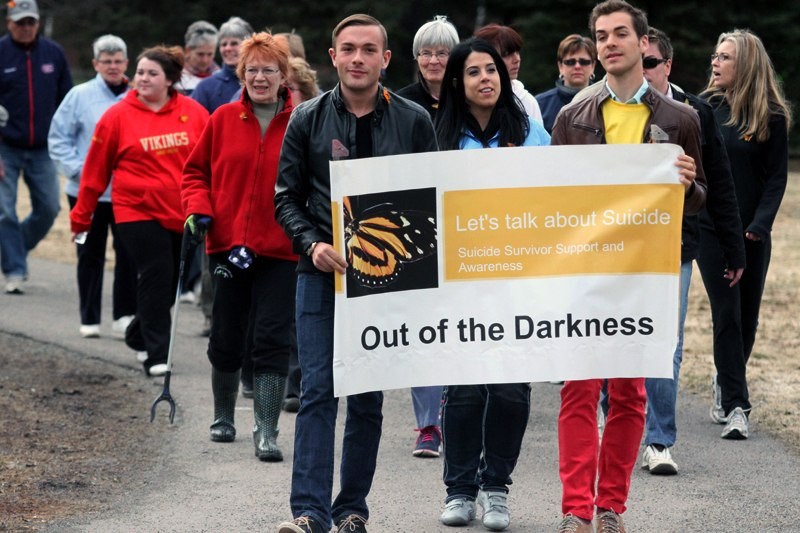THUNDER BAY -- Ashleigh Crooks is making it her life’s mission to remove the stigma surrounding depression and mental health.
She admits she might not be alive if she hadn’t spoken up and received help.
Crooks shared her battle with thoughts of suicide and mental health challenges prior to the start Out of the Darkness Memorial Walk, an annual event that raises awareness about suicide prevention.
“They’ve made it okay for people like myself to step forward and talk about mental health and suicide,” she said while holding the hand of her son Holdyn during the walk on Sunday.
“They’ve set up a forum for people suffering from illnesses to come out and talk so they’ve lessened the stigma.”
Crooks is hopeful the public perception of suicide and mental health is beginning to undergo a similar transformation to how cancer was regarded nearly 30 years ago.
Then, cancer was a silent killer that nobody wanted to talk about. She says it’s similar to suicide now, which St Joseph’s Care Group vice president of mental health and addiction services Janet Sillman said claims the lives of 100 Northwestern Ontario residents annually, a rate three times higher than the provincial average.
“I think when Terry Fox started his run cancer was this big taboo illness that people thought they could catch. With his run we started battling the disease then and realizing cancer was a disease that needed to be fought,” Crooks said
“That’s what we need to start doing with suicide and mental health...Too often people are categorized as the mental health problem they are and the person is lost to that disease.”
Crooks had suffered from mental health challenges from a young age and had been tormented by thoughts of suicide. She believed she was a burden to those around her and planning her death became a normal activity.
Eventually, however, she reached a point where she could not hide her thoughts from loved ones and received professional treatment that resulted in a diagnosis to the root of the problem.
Just as much as she is trying to educate a broad audience, the mother of two is devoted to keeping those lessons inside her house.
It’s important that her children know her story and her struggles so they comprehend the prevalence and severity of the issue.
“I want them to empathize and understand that people around them have mental health problems but also if they start to experience problems they’re not scared or afraid to come forward and discuss them,” she said.
For Margaret Hajdinjak, conversations about suicide and mental health disorders need to happen more often.
She founded the walk three years ago in memory of her son Steven, who took his own life in November 2005 at the age of 26.
“I felt that I wasn’t alone in losing someone to suicide and I wanted to have a venue for people who have been impacted in the same way,” she said.
Nearly 300 people take part in the walk, which starts at Confederation College, every year. She says there are new faces every year, though that saddens her because it’s a reminder that there are more suicides.
